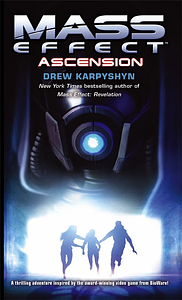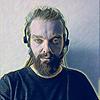You need to sign in or sign up before continuing.
Take a photo of a barcode or cover
Presne to, co mi chybalo v prvej knihe, som dostal v dvojke: 1.) Nevyskytovali sa tu postavy z hry, takze som nemal istotu ci preziju alebo nie; 2.) Zapletka pribehu bola mierne zlozitejsia ako v jednotke.
Bolo to o nieco lepsie ako jednotka, ale stale tomu daco chyba aby som mohol dat s cistym svedomim 5*. Ked si porovnam prepracovanost hier s tym aky jednoduchy pribeh maju knihy... pre BioWare su tieto knihy asi len druhorady merch ku hram.
Bolo to o nieco lepsie ako jednotka, ale stale tomu daco chyba aby som mohol dat s cistym svedomim 5*. Ked si porovnam prepracovanost hier s tym aky jednoduchy pribeh maju knihy... pre BioWare su tieto knihy asi len druhorady merch ku hram.
adventurous
dark
tense
fast-paced
Plot or Character Driven:
Plot
Strong character development:
No
Loveable characters:
No
Diverse cast of characters:
Complicated
Flaws of characters a main focus:
Yes
Another Mass Effect novel, this one taking place between the first and second game. It is focused again on Khalee Sanders, but many years after the first book, and she is working at the Grissom Academy, an human program focused on training biotics.
The story itself is mediocre. I don't think Sanders is that interesting, and while learning a bit more about biotics is cool, its not enough to keep the story going in the first half. If you can make it through the first half, the story does get significantly better with quarians heavily features, and aspects of the migrant fleet explored lending much needed variety to the story.
The characters themselves are pretty lack luster, with none of them really standing out, except for a few periphery characters that pop in and out of the story. The story is focused around the attempted use of a autistic human biotic, who Cerberus believes can help study biotic advancement.
Perhaps the biggest miss is that unlike in the first book, this one doesn't clearly link up with anything happening in the second game. The Collectors are briefly mentioned but never depicted and don't really have lasting impact. The crux of the story and even its conclusion have next to nothing to do with where the second game goes.
Overall this is a miss. There are glimmers of good here, Karpyshyn writes excellent action sequences, but it doesn't make up for the dull characters and poor pacing.
The story itself is mediocre. I don't think Sanders is that interesting, and while learning a bit more about biotics is cool, its not enough to keep the story going in the first half. If you can make it through the first half, the story does get significantly better with quarians heavily features, and aspects of the migrant fleet explored lending much needed variety to the story.
The characters themselves are pretty lack luster, with none of them really standing out, except for a few periphery characters that pop in and out of the story. The story is focused around the attempted use of a autistic human biotic, who Cerberus believes can help study biotic advancement.
Perhaps the biggest miss is that unlike in the first book, this one doesn't clearly link up with anything happening in the second game. The Collectors are briefly mentioned but never depicted and don't really have lasting impact. The crux of the story and even its conclusion have next to nothing to do with where the second game goes.
Overall this is a miss. There are glimmers of good here, Karpyshyn writes excellent action sequences, but it doesn't make up for the dull characters and poor pacing.
Another wonderful expansion to the ME universe. I loved seeing more of the quarians. A good pick for any ME fan
I really enjoyed this book.
Learning more about Quarian culture was a highlight for me. I could never be bothered to read the whole codex in the games, so all this additional info was genuinely interesting to me.
The only issue I had (if you can call it that) was that the writing style wasn't great. It spelled out every emotion each character was feeling and was filled with info dumps. But I came into this book knowing what to expect after Revelations. It was a bit awkward at some points, but for the most part I didn't really care.
Learning more about Quarian culture was a highlight for me. I could never be bothered to read the whole codex in the games, so all this additional info was genuinely interesting to me.
The only issue I had (if you can call it that) was that the writing style wasn't great. It spelled out every emotion each character was feeling and was filled with info dumps. But I came into this book knowing what to expect after Revelations. It was a bit awkward at some points, but for the most part I didn't really care.
It was really fun seeing Mass Effect characters I know in a new light.
I loved reading about the Quarians. Learning more about their culture was my favorite part of the book.
I loved reading about the Quarians. Learning more about their culture was my favorite part of the book.
adventurous
medium-paced
Plot or Character Driven:
Plot
Strong character development:
No
Loveable characters:
No
Diverse cast of characters:
Yes
Flaws of characters a main focus:
No
I think this is my favorite of the Mass Effect tie-in novels.
If there ever was a video game world that justifies having its own series of novels, it's Mass Effect. An enormous, sprawling space opera, Mass Effect was actually my first modern (read: post N64 played at grandma's house) video game, and it and its story made a huge impression on me. I cut my sci-fi teeth on Arthur C. Clarke, and this world made me feel right at home. Well, as "at home" as "OMG OMG we are all going to be killed by an ancient species of space monster robots" can make you feel.
Mass Effect: Ascension highlights the best feature of the franchise: well-written, memorable characters and a rip-roaring plot. Gillian is a young autistic biotic who is never written in a patronizing manner or as a "poor broken thing" but as a fully developed, human character. Paul Grayson, the father of autistic Gillian, is simultaneously despicable, pitiable, and relateable. The high note was when we got to spend time among the Quarians: a race of aliens who have lived in exile on enormous ships for generations, causing their immune systems to effectively become useless and who have to isolate themselves in protective suits. The interactions between Gillian and the Quarians were both heartwarming and delightful.
If you love Mass Effect, you absolutely should read the Karpyshyn novels. If you've never played Mass Effect and love science fiction, I'd still say you should read the Karpyshyn novels. My Dad (Who introduced me to sci-fi in the first place), thoroughly enjoyed all of them (enough so that he even went out and BOUGHT them), even though I've yet to get him to play the games.
One of these days...!
If there ever was a video game world that justifies having its own series of novels, it's Mass Effect. An enormous, sprawling space opera, Mass Effect was actually my first modern (read: post N64 played at grandma's house) video game, and it and its story made a huge impression on me. I cut my sci-fi teeth on Arthur C. Clarke, and this world made me feel right at home. Well, as "at home" as "OMG OMG we are all going to be killed by an ancient species of space monster robots" can make you feel.
Mass Effect: Ascension highlights the best feature of the franchise: well-written, memorable characters and a rip-roaring plot. Gillian is a young autistic biotic who is never written in a patronizing manner or as a "poor broken thing" but as a fully developed, human character. Paul Grayson, the father of autistic Gillian, is simultaneously despicable, pitiable, and relateable. The high note was when we got to spend time among the Quarians: a race of aliens who have lived in exile on enormous ships for generations, causing their immune systems to effectively become useless and who have to isolate themselves in protective suits. The interactions between Gillian and the Quarians were both heartwarming and delightful.
If you love Mass Effect, you absolutely should read the Karpyshyn novels. If you've never played Mass Effect and love science fiction, I'd still say you should read the Karpyshyn novels. My Dad (Who introduced me to sci-fi in the first place), thoroughly enjoyed all of them (enough so that he even went out and BOUGHT them), even though I've yet to get him to play the games.
One of these days...!
adventurous
fast-paced





